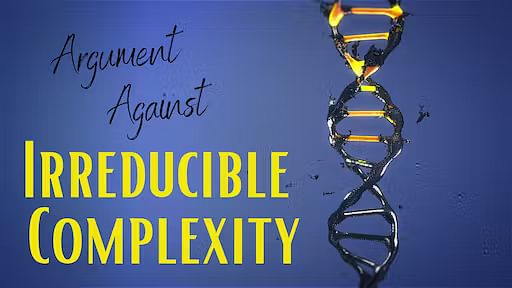
The argument from irreducible complexity is an argument against evolution that claims that certain biological systems are too complex to have arisen through gradual, incremental changes. These systems are said to be "irreducible" because they would not function if any of their parts were removed.
One of the most common examples of irreducible complexity cited by proponents of this argument is the bacterial flagellum. The flagellum is a whip-like structure that allows bacteria to swim. It is composed of several different parts, each of which is said to be essential for the flagellum to function.
Proponents of the argument from irreducible complexity argue that the flagellum could not have arisen through evolution because it would have been impossible for all of the necessary parts to come together at the same time. They argue that the flagellum must have been created by an intelligent designer.
However, there are several arguments against the argument from irreducible complexity. First, it is not clear that any biological system is truly irreducible. In many cases, it is possible to identify intermediate forms that could have functioned even though they did not have all of the parts of the fully-evolved system.
Second, even if some biological systems are irreducible, this does not necessarily mean that they could not have arisen through evolution. Evolution can work by creating new functions for existing parts, or by duplicating existing parts and then modifying them. This means that it is possible for a complex system to evolve even if it does not have all of its parts at the same time.
Third, the argument from irreducible complexity is based on the assumption that natural selection can only work by making small, incremental changes. However, there is evidence that natural selection can also work by making larger, more drastic changes. This is known as punctuated equilibrium.
In conclusion, the argument from irreducible complexity is not a valid argument against evolution. There are several arguments against the argument, and there is no evidence that any biological system is truly irreducible.
Here are some additional arguments against irreducible complexity in humans:
- The human body is constantly evolving, and there are many examples of vestigial organs that are no longer necessary for survival. This suggests that the human body has evolved through gradual, incremental changes.
- There is a great deal of evidence that the human genome is highly conserved, meaning that it has changed very little over time. This suggests that the human body is not the product of a single, complex event, but rather the result of many small, gradual changes.
- The argument from irreducible complexity is based on the assumption that natural selection can only work by making changes that improve an organism's fitness. However, there is evidence that natural selection can also work by making changes that have no immediate effect on fitness, but that may be beneficial in the long run.
In conclusion, there is no scientific evidence to support the argument from irreducible complexity. The human body is a complex system that has evolved through gradual, incremental changes.





